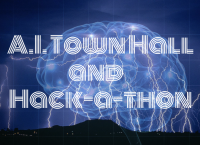Jefferson Lab staff and scientific users are exploring how artificial intelligence and machine learning can benefit ongoing scientific research and R&D.
Artificial Intelligence (AI) is a burgeoning field in science and computing with the goal of training machines to make determinations on a course of action in a manner similar to a human. Machine learning (ML) is a branch of AI in which algorithms take sample data, called training data, and build a mathematical model that uses pattern identification and inference to make predictions or decisions instead of being told exactly what to do. Jefferson Lab is focusing on leveraging AI and ML to move state of the art forward in nuclear and accelerator physics. We have a data science department dedicated to work on various AI/ML projects. In addition, there are staff members and scientific users who are working on projects that apply AI/ML to problems in their fields of expertise, including nuclear and accelerator physics problems.
Jefferson lab is hosting a virtual AI town hall on July 26, 2021. This is an opportunity for all the staff and collaborators/users working or planning to work on AI to present a 5 min lightening talk on their projects. There will be a one day virtual AI hackathon on the following day where people from all skill levels are welcome to join. Tutorials on Jlab Jupyterhub and GPUs will be presented at the beginning of the hackathon. Please click here to register for the events.
Date: July 26-27, 2021
"Extracting the Most from Collider Data with Deep Learning"
Dr. Ben Nachman (LBL)
Abstract
“Precise scientific analysis in collider-based particle physics is possible because of complex simulations that connect fundamental theories to observable quantities. These simulations have been paired with multivariate methods for many years in search of the smallest distance scales in nature. Deep learning tools hold great promise to qualitatively change this paradigm by allowing for holistic analysis of data in its natural hyperdimensionality with thousands or millions of features instead of up to tens of features. These tools are not yet broadly used for all areas of data analysis because of the traditional dependence on simulations. In this talk, I will discuss how we can change this paradigm in order to exploit the new features of deep learning to explore nature at sub-nuclear distance scales. In particular, I will show how neural networks can be used to (1) overcome the challenge of intractable hypervariate probability density modeling and (2) learn directly from (unlabeled) data to perform hypothesis tests that go beyond any existing analysis methods. The example for (1) will be full phase space unfolding and the example for (2) will be anomaly detection. The talk will include a discussion of uncertainties associated with deep learning-based analyses.”
Date: June 30, 2021
Join with Bluejeans: https://bluejeans.com/451415148/8427
“Graph Neural Networks and Metric Learning for the Future of Particle Physics”
Dr. Daniel Murnane (LBL)
Abstract
"The discovery of the Higgs boson at the Large Hadron Collider was a colossal effort that brought together many advanced experimental, theoretical and computational techniques. We are opening a door to a new generation of particle physics experiments that will try to answer questions about dark matter, dark energy and why the universe seems to be so perfectly tuned for complex structures, like life. Many Higgs-era techniques may not be powerful enough for these new energy/intensity scales, and so we turn to machine learning (ML) techniques to help answer these questions. It turns out that not only does ML boost our ability to discover new physics, it also challenges us to think about physics problems in new ways."
Join with Bluejeans: https://bluejeans.com/260264787
Date: June 02, 2021
"Interpretable Machine Learning for Physics, using Symbolic Regression and Graph Neural Networks"
Miles Cranmer
“In this talk I will argue two points. 1) Symbolic regression, a machine learning technique that fits data by iteratively searching the space of all possible analytic equations, should be a standard machine learning algorithm in physics. 2) Symbolic regression can be extended to high-dimensional spaces, such as to models for N-body simulations, using the method we have developed.
Date: May 05, 2021






